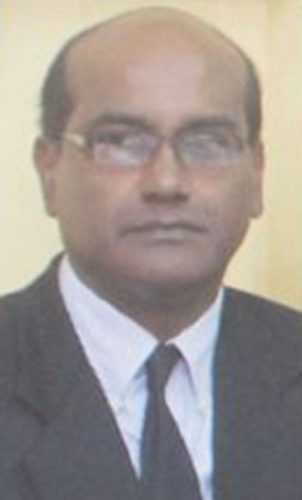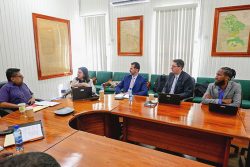The Guyana Court of Appeal yesterday cleared the way for the Guyana Elections Commission (GECOM) to proceed with a recount of the ballots cast in the March 2nd general and regional elections but emphasised that GECOM cannot delegate its supervisory authority to any other body.
In a two to one decision, the Appeal Court allowed a sliver of APNU+AFC candidate Ulita Moore’s appeal and ruled that GECOM has the authority to do a recount of ballots but cannot accord this power to any other body as appeared to have been suggested in a GECOM press release which said that a Caribbean Community (CARICOM) team would “supervise” the recount.
While a portion of Moore’s appeal was allowed, President of the Court of Appeal panel, Justice Dawn Gregory ruled that the matter would not be remitted to Justice Franklyn Holder’s court since the Appeal Court had already examined the matter.

The ruling effectively allows GECOM to go ahead with the recount of the March 2nd ballot even though one of Moore’s lawyers, Roysdale Forde, indicated that he wanted further clarity on the issue and was expected to email a letter to the court by 8pm last night and Anil Nandlall, the attorney for Opposition Leader Bharrat Jagdeo, gave a commitment that he would respond by 8 am today. Shortly thereafter, the court is expected to issue a written copy of its ruling and consequential orders.
While Justice Gregory and Justice Brassington Reynolds partially allowed Moore’s appeal, Justice Rishi Persaud ruled against and instead fully agreed with the Full Court decision that Justice Holder had no jurisdiction to hear Moore’s matter.
In allowing the appeal on a slim basis on the issue of jurisdiction, Justice Gregory said the jurisdiction of the High Court is a narrow one and it was invoked by the description of the authority of the CARICOM team relative to the constitutional powers of GECOM.
However, she said, even if Justice Holder was allowed to exercise jurisdiction, it could have been no more than to indicate or inquire what was the nature of the arrangement and to express the unlawfulness of any agreement which took away any of GECOM’s power of supervising the elections and placing that power into the hands of anyone else.
“Had he been allowed to exercise that jurisdiction; he would have had to correct and to order that that relationship considered be adjusted to reflect that GECOM is the constitutional body charged with the supervision and management of elections…” Justice Gregory said.
In allowing the appeal “in a small part” as she does not agree with the Full Court that everything was to be referred to an elections court, the judge essentially dismissed the appeal with that exception.
On a request for further clarification from Jagdeo’s lead counsel Senior Counsel Douglas Mendes, Justice Gregory said if a party feels that GECOM was acting outside of its constitutional authority, then the High Court does have jurisdiction in its constitutional supervisory jurisdiction to examine those alleged breaches.
She, however, made it clear that she does not propose to send the matter back to the High Court as the Appeal Court would have described the nature of the High Court’s jurisdiction. She said that GECOM’s power must be viewed within the context of Article 162 of the Constitution as it was Moore’s contention that certain things were to happen (the supervision of the recount).
Justice Gregory noted that the Chairperson of GECOM, retired Justice Claudette Singh, in her submission to the court did point out the powers the commission has, and that it was entitled to take such action that it deems necessary to ensure fairness and impartiality.
Justice Gregory said that the court did not see the point in returning the matter to Justice Holder. “I [do] not see any need or any point in returning the matter to the High Court, because this court has articulated the scope of that power,” she said
Attorney Timothy Jonas, who is representing some respondents in the matter, pointed out the issue of the application by Moore being dismissed as was done by the Full Court and what would happen to the consequential orders.
Justice Gregory responded that the Appeal Court, having to an extent ruled in Moore’s favour, could not dismiss her application and suggested that rather it would be that the matter is spent.
She further stressed that the court grants the order that any agreement in which supervision of the election is removed from GECOM and ascribed to anybody else, will be unlawful.
“She asks for that and I believe that she has to get that particular order. I am granting her that order… The matter will not go back [to the High Court],” the Appeal Court’s president said.
Forde said that having heard the decision of the court, he observed that it allowed the appeal to some extent and as such he would await the court’s further analysis. He requested the court to consider the fact that it had decided that the appeal is allowed in part, adding that “to some extent, I myself am uncertain having found that the appeal is allowed in part.”
He asked the court to consider remitting the matter back to Justice Holder but Mendes strenuously objected to this move.
It was at this point that Justice Gregory said she was willing to hear further submissions from Forde on the matter if he thinks it is important enough but she added that this must be done urgently. She again emphasised that the matter should not be returned to the High Court as it has already examined the issue that could be examined.
‘Dismissed’
In dismissing Moore’s appeal, Justice Persaud said having regard to all the circumstances of the case, including its national importance, he could not fault the judges – acting Chief Justice Roxane George-Wiltshire and Justice Nareshwar Harnanan – sitting in the Full Court, in exercising their discretion in the way in which they did.
“The challenges to the jurisdiction of pending proceedings warrant immediate intervention and clearly there is no public interest in proceedings continuing which are unlawful…” the judge said.
Further, Justice Persaud said, he fully agreed with the Full Court’s analysis of the authorities and their subsequent exercise of discretion as he can see no other circumstance that is exceptional than that which operates in the case.
He said he is in full agreement with the comprehensive analysis and impeccable reasoning and irresistible conclusions arrived at by the Full Court as it relates to the jurisdiction of the High Court.
He endorsed the ruling of the Full Court which states: “This court is of the view that the filing of judicial review undermines legislative process which affects finality in the elections process. We are quick to point out however, that finality does not mean lawfulness, lawfulness can always be challenged by way of an elections petition. On this point it is clear that the filing of these judicial review proceedings has had the contrary effects to facilitating the efficient completion of the 2nd of March 2020 national and regional elections. This is the clear demonstration of the type of mischief which the legislation intended to address by providing in plain and simple language that these challenges should be addressed by elections petition. The entire scheme of the legislative matrix points significantly to the fact that the elections process must swiftly and efficiently take its course so as to enable the elections results to be declared.”
Justice Persaud found the fact that the constitutionality of Section 22 did not come into play in the fixed date application that initiated the proceedings an unacceptable state of affairs since the constitutionality of Parliament is assumed and the burden of providing otherwise is a heavy one.
Justice Persaud noted that in his ruling, Justice Holder made no attempt to interpret the constitutionality of the jurisdictional issue and no argument in that regard was proffered. According to the judge, Justice Holder merely ruled on the jurisdictional issue which had no bearing on the interpretation of the Constitution as is mandated by Article 133. The order also could not be seen as a final order as is again mandated by the said article.
He said the Full Court properly assumed jurisdiction to determine the appeal from Justice Holder’s preliminary ruling.
‘Primary Mission’
For his part Justice Reynolds noted that GECOM’s primary mission, set out in articles 62 and 162 of the Constitution, is to conduct the electoral process. He noted that the operational phases of the elections are detailed very minutely in provisions of the Representation of the People Act and are a virtual road map for the entire electoral process.
“At the risk of oversimplifying the issues, I wish to draw an analogy between the GECOM hierarchy and the anatomy and physiognomy of a human being. The Chief Election Officer being its shoulders, the Returning Officers and other…elections officers operating as its arms and legs with the commission standing as its head complete with its brain, eyes, ear, nose and mouth,” Justice Reynolds said.
He added that a fail-safe mechanism is also afforded the commission; Section 22 of the Elections Law Amendment Act, which empowers it to deploy remedial administrative and logistical measures to remove difficulties which may arise going in the electoral process so as to guarantee efficacy and efficiency in the operational phases. And Section 140 of the Representation of the People Act can be likened to a helmet for added protection, he added.
Touching on Moore’s application and what she sought in the High Court, Justice Reynolds said they could be narrowed into two broad categories, the failure to declare the results of the national and regional elections and secondly, the decision to have a recount of all ten electoral districts predicated upon an agreement “which on the face of it outsourced the supervisory preserved of the elections commission.”
He said it is clear upon examination of all the case law and other authorities, the issues surfaced in the first set of reliefs prayed for by Moore in the first category because they may well require the taking of evidence to resolve the presumptions which they make. He said those issues are best resolved through recourse to an elections petition.
But, he said, he believes that it was the second category which is centred upon the agreement that warrants attention.
Justice Reynolds said that while Section 140 prohibits the court from enquiring into conduct, performance, non-performance and other actions of the commission, the issue of the agreement fell outside of the constitutional regime and remit of the commission. As such, he ruled that the court’s supervisory jurisdiction was preserved for such purposes.
“…it is my respectful view that it will be remiss of the court to expect the appellant to await the outcome of an elections petition to redress this issue. It is my respectful opinion that this development having been brought to the attention of the court, while being actively concerned wholly outside of the scope of the commission’s constitutional remit, warranted the intervention of the court in its supervisory constitutional jurisdiction,” the judge said.
He said that the court, in its supervisory jurisdiction, is in a position to say to GECOM that it should not outsource its supervisory responsibility in terms that is outside the scope of its constitutional remit. For that reason, and others, which he said were more fully detailed in Justice Gregory’s judgment, he was in agreement with her findings and the order she makes.
Judicial review
Moore had applied to the High Court for judicial review by way of an application in which she contended that GECOM could not order a recount based on an Aide Memoire signed by President David Granger and Opposition Leader Bharrat Jagdeo.
President Granger had contacted CARICOM Chair, Prime Minister of Barbados Mia Mottley, and agreed for a recount to be done following controversy over the tabulation of the votes cast for Region Four, which opposition parties as well as international and many local observers say was not done in a transparent and credible manner.
Following the president’s request, Prime Minister Mottley had put together what she described as an independent high-level CARICOM team, which traveled to Guyana to supervise the recount. This was, however, aborted after Moore filed her application and was granted the injunction against the recount.
In the High Court, Holder had granted Moore interim injunctions halting the recount process until her case would have been fully heard and determined.
However, the Opposition challenged this and the Full Court dismissed Moore’s case and discharged the injunctions on a finding that her matter ought to have come by way of an elections petition as opposed to an application for judicial review.
This was Jagdeo’s position regarding Moore’s case, which he argued that Justice Holder did not have jurisdiction to hear.










